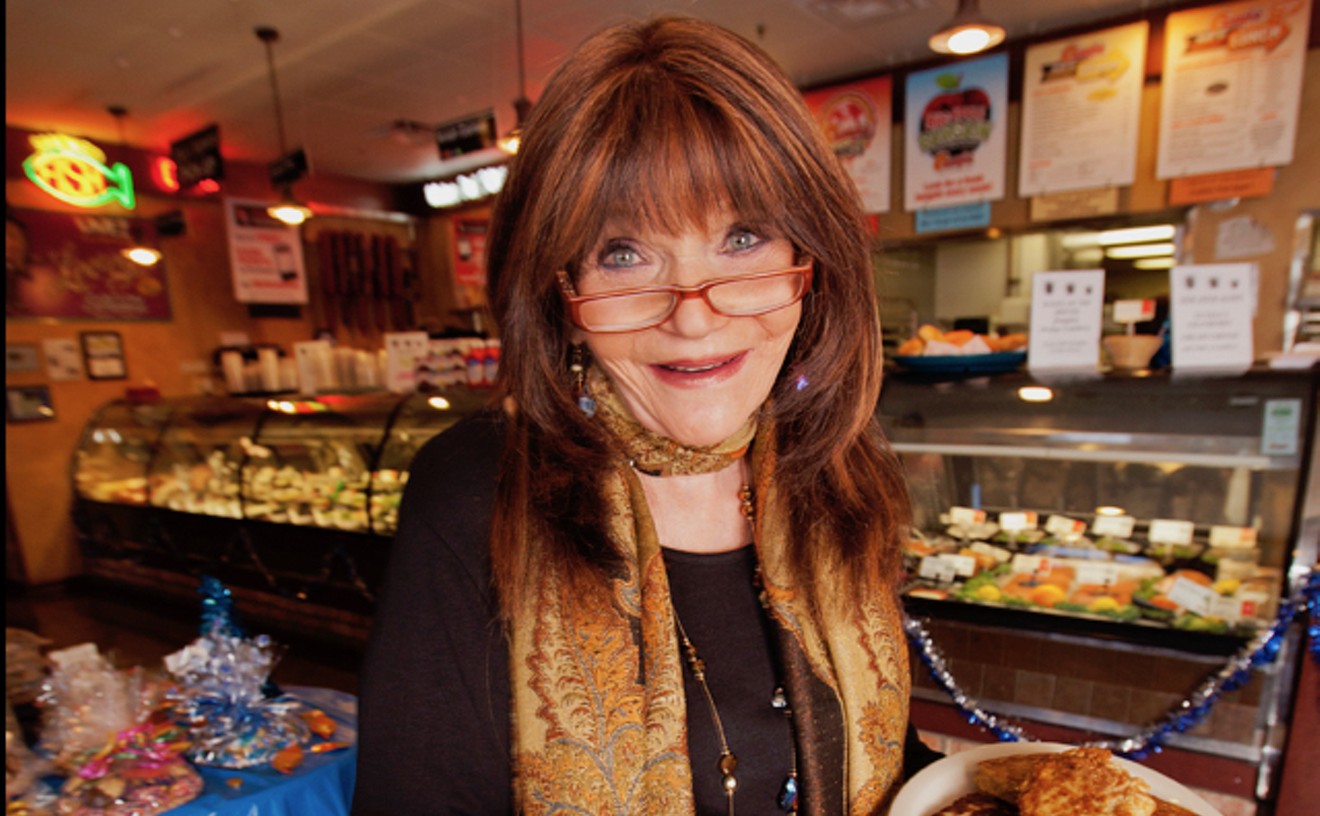I understand the constraints of time, especially in mid-December. Many of the cheese-bringers come from work. They stop at a store and pay way too much for the convenience of a black plastic dish disguised, with mounds of yellow and white cubes, as a cheese tray. Sometimes a cluster of grapes is part of the masquerade. Just once, I wish that all of those cheese-loving good intentions could unite. Maybe each person could bring one kind of cheese. Good cheese. I'd be happy to bring an empty platter.
Finding good cheese in Phoenix requires motivation and a little inside information. Most grocery stores offer a few "better" cheeses. But which cheese is the good cheese?
For starters, avoid any cheese or cheese product that isn't sold in the dairy case. If you want flavor, avoid bargain-priced Cheddar, Colby, Monterey Jack and Swiss. These cheeses will fill up your platter, but they taste like mass-produced cubes of rubber and fat. These cheeses are made to be sold with little or no aging.
Cheese is aged to develop taste. As cheese ages, it loses water, and becomes more dense and flavorful. Compare Parmigiano Reggiano (an aged imported Italian Parmesan cheese) with the Parmesan cheese you buy in a can. One tastes and feels like sawdust; the other like a sweet, crumbly slice of heaven.
Phoenix has a surprising source for Gouda, a Dutch cow's milk cheese that ages with flavor and grace. The House of Rice, 3221 North Hayden in Scottsdale, an Asian food oasis, carries several types of imported Gouda that I tried.
The aged Gouda was incredible. It was almost as hard as aged Parmesan, and just as flavorful. It could be used as a Parmesan substitute. With a deep, toasted-nut flavor, and sweet, buttery undertones, the aged Gouda is a bargain at $6.99 per pound. The best Parmesan often sells for twice that price.
Both mild Goudas were good. The spiced was pleasingly studded with cumin seeds and had soft flavors of cumin, mustard, smoke and pepper. The plain mild tasted buttery and a little smoky.
But the medium Gouda, the only bad cheese in the lot, was bland and disappointing.
Feta is the white cheese crumbled on Greek salads. I bought four fetas at the Middle Eastern Bakery and Deli, 3052 North 16th Street. A fifth cheese was the "Athenos" brand, which I bought at a grocery store and really disliked. Really. It was sour and bitter. The expiration date was four months away and it smelled fine, so I assume it's supposed to taste that way.
I chose the Middle Eastern Deli as my main source because I generally like its products, and because the owners keep most of the feta they sell in tubs of brine (salted water). Feta should be stored in a brine solution unless you plan to use it within a few days because brine acts as a preservative. It also stops the aging process and gives the cheese a pickled flavor. Rinse the cheese before serving to remove excess salt.
The French feta was my favorite, and the Bulgarian a close second. Both are made with sheep's milk. The French was the creamiest, though still crumbly, and had a buttery flavor. The Bulgarian was a mouthful of tangy and peppery flavors.
I tried two Greek fetas. One was domestic, made with cow's milk, and tasted a little musty. The other was imported from Greece, made with sheep's milk, and tasted flinty. The Greek feta had a texture like finely ground chalk. This texture was actually pleasant.
Tasting several types of the same cheese works well at a dinner party or wine-tasting. When it comes time to prepare a holiday cheese platter, you should probably opt for a selection of different kinds of cheese, instead of several versions of the same cheese.
Get cheeses that represent a spectrum of flavor and texture. Start with something mild, like Brie. Get a veined (blue) variety such as Stilton or Maytag Blue. Include an aged cheese such as Gouda or Cheddar. An herb-coated chèvre (goat cheese) is always a good choice.
When tasting, start with the mildest and work your way up to the strongest. This way the flavors of the heartier cheeses won't overwhelm your palate and obscure the milder offerings.
Allow your cheese to sit at room temperature for about an hour before serving. This brings out the fullest flavor. Cheese has a lot of fat, and cold fat won't melt in anyone's mouth.
And don't cut the cheese into cubes or slices. Put out a knife and let your guests help themselves.
Serve your cheese with fresh French bread. If you have time, thinly slice the bread, brush it with a little olive oil, and bake in a single layer at 325 degrees for about 15 minutes. These toasts are better than any store-bought cracker. Flavored crackers will obscure the flavor of the cheese.
Ask questions at the store. Sample the cheeses you are considering. Buy cheese in small quantities so it gets eaten before it goes bad. Once opened, store your cheese covered with plastic wrap. Don't freeze cheese because it will never taste the same.
A friend was recently told by his doctor that he had to dramatically lower his cholesterol. As a good friend, I volunteered to take all sorts of fat-laden foods off his hands. I ended up with a tub of goose fat and a two-pound round of Maytag Blue cheese (arguably the best American-made blue cheese). My friend is now 40 pounds lighter, and I really enjoyed the cheese. His doctor improved both of our lives. After all, a good cheese is hard to find.
Andy Broder writes about food, develops recipes and teaches cooking classes in the Valley.
Contact Andy Broder at his online address: [email protected]










